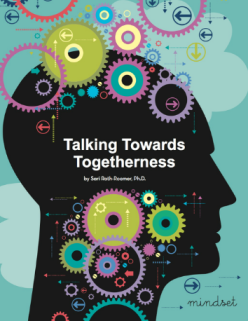 The new AZ-Lifestyle.com Romance Issue is out!
The new AZ-Lifestyle.com Romance Issue is out!
Take a look at the new Mindset Column:
http://az-lifestyle.com/2013/2/213.html#p=60
What would you say is the key to a good relationship? Is it love? Is it romance? Is it sharing common interests and values? Is it old-fashioned chemistry? The truth is, we need all these things to make a relationship work, but without honesty, kindness and healthy communication, none of that stuff alone will keep a relationship together.
Holding two people in a loving relationship can be work at times. Opinions, wants and needs between a couple will necessarily differ from time to time, creating conflict. That’s normal. The problem occurs when people are surprised by and or intolerant to these naturally occurring differences that arise. When we expect that our relationships will have a general sense of ease, but will be scattered with occasional conflict and differences of opinion, we are less likely to be surprised when the discord occurs and more likely to handle it well.
Researchers have found that how a couple handles disagreement can predict the relationship’s success or failure. There are rules of conflict. Most of us are aware that name-calling is a “no-no”; that’s belittling and unkind. Just don’t do it. Saying something intentionally hurtful to wound or shame another person is also off limits.
It starts with respect for the fact that we each have our own opinion in a relationship. When we hold an awareness that just as our own perspective makes perfect sense to us, our partner’s perspective makes perfect sense to them, we set ourselves up for success in our relationships. We may not always agree, but tolerating differences of opinion can certainly strengthen a relationship and help it mature well.
If something is bothering you, it is important to talk about it. Keeping things bottled up inside can lead to growing resentment, passive aggressive behavior and emotional outbursts which can damage a relationship. Letting others know your needs is critical. If you don’t let others know there’s an issue, they won’t know (most of us mortals don’t read minds) and the problem won’t get fixed. Remember, disagreement doesn’t have to mean fight. There are kind ways to share your concerns. In fact, communicating brings about solutions and can actually connect you even more closely with the one you love.
When in doubt, follow these general rules of thumb for successful communication:
- Speak from a place of purpose, calm and love – If you aren’t aware of what your goal is, how can you achieve it? If you’re upset and angry, how will you be listened to and how will you ever get your point across? Remember you are speaking to someone you love, so speak kindly.
- Avoid pointing the finger and getting defensive- Take responsibility for what is yours. When you blame, people get defensive and stop listening, causing communication to break down.
- Address underlying feelings – Sometimes we’re not talking about what we think we’re talking about. Speak to the emotion and not the content when you’re talking about the tough stuff. “I’m sorry your upset,” acknowledging another’s feelings and is hugely supportive.
- Remember, it’s all in your perspective -Avoid making your truth sound like THE truth. Acknowledge that this is the way you are looking at the situation, which may differ from your partner’s. “You just don’t get it,” works less well than, “The way I am seeing it…”
- Keep a Sense of Humor – Be careful not to take yourself too seriously. Laughter can ease tension and often helps you gain a new perspective.
- Really Listen – Try to listen to and appreciate your partner’s perspective without dismissing it off hand. Everyone has a right to their own opinion. Repeat back what is said to you and let them know you’re listening.
Sometimes, if you’ve had the opportunity to share your feelings, it’s helpful to agree to disagree. “I love you too much to argue,” can work like a charm and puts the emphasis on the importance of your relationship and not the topic of the conversation. “You may be right,” gets you out of the power struggle and back to your relationship. It’s not a concession, just a recognition that your partner’s perspective matters too. That’s the problem, sometimes we forget that our partner may feel as strongly about their perspective as we do about ours. With that very awareness, we let go of right and wrong, and move towards acceptance and resolution.
Talking with the one you love is always a good choice…good times or bad times, honest & kind communication is what will keep relationships together.
Be happy and well,
Sari Roth-Roemer
